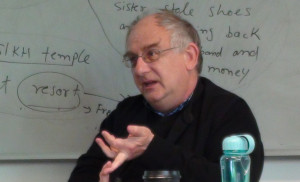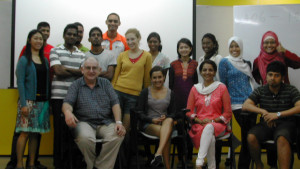Call for more schools to teach Hindi
Dr Peter Friedlander
The Australian National University (ANU) South Asia Research Institute is calling for more Australian schools to teach Hindi or risk Australia falling behind in its relationship with India.
The Institute will hold a workshop for education and language specialists on Friday to help develop a national structure for developing Hindi language studies across the country, with a national website and teacher training on the agenda.
Project leader Dr Peter Friedlander said that while Hindi was identified in the 2012 Asian Century White Paper as one of five priority Asian languages, take up has been minimal.
“Clearly not enough schools are teaching Hindi,” Dr Friedlander said.
Dr Peter Friedlander and Sandhya Singh with 10 Second Semester LG2 Hindi students
“It’s really important for Australia to realise that India is a significant Asian partner with about $17 billion in bilateral trade between the two countries each year, and that’s growing all the time.
“Unless Hindi take up is improved we will be at a disadvantage with our dealings with India. You need to understand what’s happening culturally,” he said.
“The big risk is that other countries will make themselves more India literate and will be able to take better advantage of connections with one of the world’s fastest growing economies,”
India already has a strong presence in Australia. Census data shows around 300,000 Indian born people in the country, and more than 100,000 speaking Hindi at home. This is around double the number that speak either Indonesian or Japanese, two other priority Asian languages.
In the past year the Australian Curriculum, Assessment and Reporting Authority (ACARA) has created a national Hindi curriculum which should be implemented from 2016. This means that Hindi can be studied at any school in Australia.
Dr Friedlander said the workshop will be the first time key stakeholders are brought together on a national scale to discuss the issues involved with Hindi language in Australia.
“Now the groundwork is in place, we need to make sure it is actually taught around the country,” Dr Friedlander said.
“We want to build a forum for collaboration between the Australian states and territories. We want to discuss ideas for on-going structures.
“We’ll be looking at the possibility of a national website with information on where and how Hindi can be studied.
“The workshop will look at how we can train and certify good Hindi teachers,” he said.
Dr Friedlander said that in 20 years he would like to see Australia as an Asian literate nation paying the same amount of attention to India that it does the other major Asian nations.
Short URL: https://indiandownunder.com.au/?p=5258


